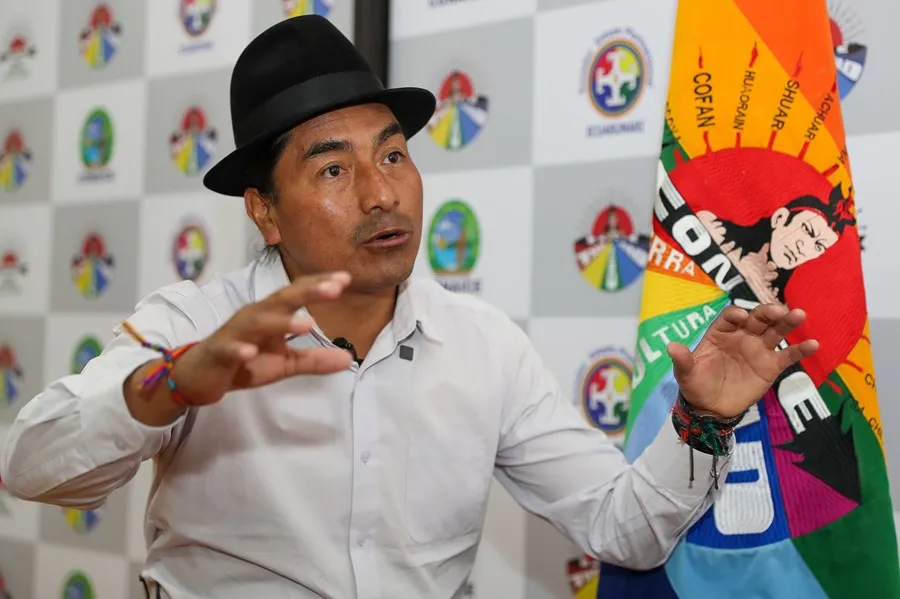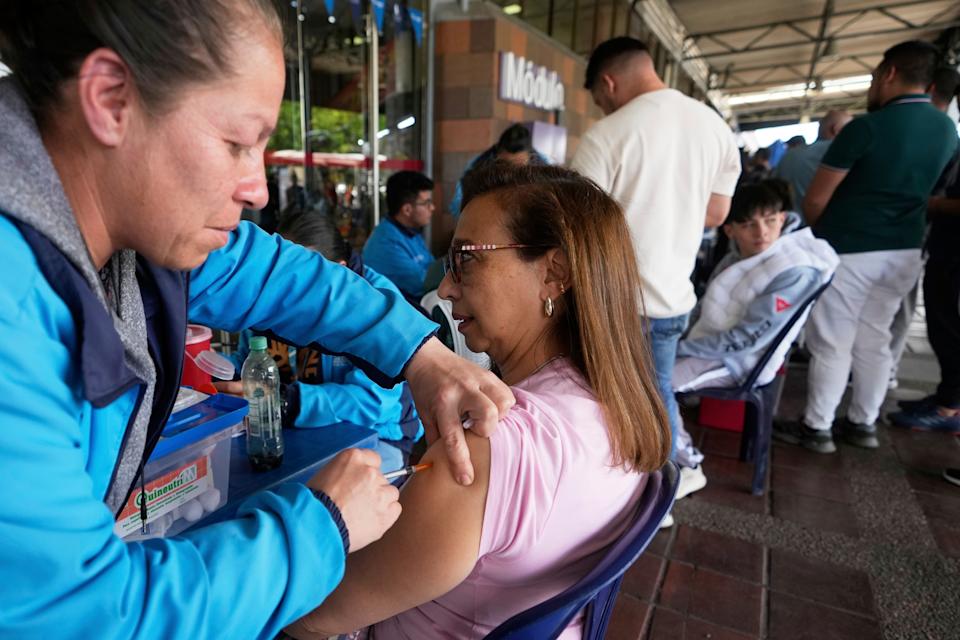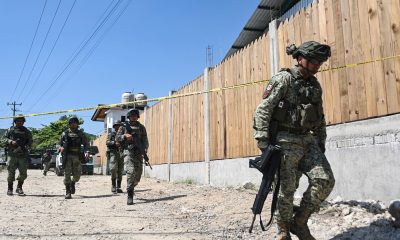International
Indigenous candidate Leonidas Iza predicts a new social explosion if there is no change in Ecuador

The presidential candidate of Ecuador for the indigenous movement, Leonidas Iza, who was part of the wave of protests of 2019 and who led that of 2022, reveals himself as an “anti-system” politician in the face of “a corrupt system” that he intends to reformulate to relieve the impoverished, because he predicts a new social explosion if there is no change in the Government to meet popular demands.
Iza, 42, is the candidate of Pachakutik, the political arm of the Confederation of Indigenous Nationalities of Ecuador (Conaie) that he himself presides over, and with which he was at the forefront of the 2022 wave of protests against the government of conservative President Guillermo Lasso, where he was arrested and even labeled a “terrorist.”
“I am one of those who has never lost the ability to be outraged when governments have had policies against their own citizens,” Iza, a native of the Andean province of Cotopaxi, said in an interview with EFE.
“I am not against the private sector, I am against those who do not pay taxes and those who come to the Government only to defend their companies,” said the candidate in reference to the last two presidents (Lasso and Daniel Noboa).
“We fight for social justice, not to be violent. It is a reaction to the injustice to which we have been subjected,” he said.
For Iza, who represents the anti-extractivist left of Ecuador, the country has “a corrupt system, a health system that does not work, a deficient and unfair economic system, and public services that are not helping citizens.”
“And that’s what we want to change. We won’t be able to do it overnight, but the State can give relief to the people,” the candidate said.
To do this, it proposes to fight against tax evasion, which amounts to about 7.5 billion dollars a year, and also against corruption, which is estimated at about 3 billion dollars per year, to balance public accounts without having to follow the current credit program with the International Monetary Fund (IMF) that asks to cut public spending and raise taxes.
He also aimed to increase agricultural productivity, as well as boost tourism to go from 1 to 3 million visitors a year, and anticipated that he will regulate small and artisanal mining to avoid illegal mining but will not allow large-scale mining because it considers that it can contaminate the country’s large river basins.
Iza anticipated that he will not pay the external debt as long as there are “guaguas (children, in Kichwa) who have no education and are dying of hunger, and colleagues who are dying for lack of health.”
“We will tell the IMF and the other multilaterals that we are going to pay, but first we are going to solve the structural problem we have at the moment: education, health and minimum conditions for security,” he warned.
In that sense, Iza pointed out that “the strength of a popular reaction in the streets is accumulating” that must be resolved by whoever is elected. “Knowing my country, which has been on the streets all its life, there will be a popular reaction if (the discomfort) is not resolved in the following months,” he reiterated.
“The option that understands the people is us, and not the sectors that have always been in the Government,” said Iza, who avoided pointing out whether that reaction will reach the dimensions of the strong protests of 2019 and 2022, both led by the indigenous movement.
In this electoral campaign, Iza has left his distinctive Andean red poncho to put on the bulletproof vest in the face of the persistent wave of violence of organized crime that the country is experiencing, because he warned that the “war” that Noboa declared to the criminal gangs has not worked because its leaders are still free.
Faced with this, he promised “a hard hand for all” and recalled that “state institutions must suffocate everyone (criminals)”.
The candidate also advocated deepening international cooperation: “there must be a responsibility of all countries (producers, consumers and drug transit), especially in the region (of Latin America)”.
Asked if Ecuadorian society is ready to have an indigenous president of rural origin, Iza sees himself with popular support to face “the most reactionary sectors that have support in racism and stigmatization.”
International
Arsenal stun Real Madrid at the Bernabéu to reach Champions League semifinals

Arsenal enjoyed a “historic night” on Wednesday after defeating Real Madrid 2-1 at the Santiago Bernabéu, knocking them out of the Champions League quarterfinals, midfielder Declan Rice said.
“It’s such a special night for this club, a historic night for this club,” said Rice, who scored twice in the first leg in London, speaking to TNT Sports.
The English international was named Man of the Match in both legs — the 3-0 win in London and the second leg in Madrid.
“It’s amazing. I knew we were on an upward trajectory and we’ve done incredibly well in this competition. We deserve it and we have full confidence in our coach. Reaching the semifinals is unbelievable,” Rice added.
International
DeSantis’ immigration crackdown sparks alarm in Venezuelan Communities in Doral

Florida, the U.S. state with the third-largest immigrant population, has become the most aggressive in targeting undocumented immigrants, largely due to pressure from Governor Ron DeSantis. This shift has led Latino-majority cities like Orlando and Doral to authorize their police forces to assist in immigration enforcement.
In Doral — part of the greater Miami area where 70.7% of residents are immigrants and 48% are of Venezuelan origin — the City Council is expected to approve a measure this Wednesday allowing local police to collaborate with Immigration and Customs Enforcement (ICE), despite opposition from neighborhood groups and human rights activists.
“It’s yet another betrayal,” said Susana Ríos, a 57-year-old Venezuelan woman currently under Temporary Protected Status (TPS), whose extension was denied by the White House and is now being challenged in court.
Meanwhile, José González, a 21-year-old immigrant, said he feels “abandoned.” He can’t stop thinking about the images of Venezuelans deported to El Salvador without due process. “We’re all in danger,” he warned.
International
Bogotá residents line up for yellow fever vaccine amid national alert

David Suárez went to a public health center in Bogotá on Wednesday to get vaccinated against yellow fever. It wasn’t originally in his plans, but he responded to a call made just hours earlier by President Gustavo Petro, who announced he will declare a health and economic emergency due to a new outbreak of the disease that has already left more than 30 people dead, mostly in the central-western region of the country.
“I got vaccinated for two reasons: first, for my own health because I’m traveling, and second, for a social reason — simply to follow the president’s guidance and be aware that this is a problem for all of us,” said Suárez, a 39-year-old teacher, to The Associated Press.
Like Suárez, dozens of people were waiting in line for the vaccine at Bogotá’s main intercity bus terminal, a key transportation hub especially crowded during travel seasons like Holy Week.
The teacher is traveling with his family to the department of Huila, which has activated a contingency plan due to its proximity to Tolima — the epicenter of the yellow fever outbreak — where a state of public calamity has been declared.
-

 International4 days ago
International4 days agoNightclub Collapse in Dominican Republic Claims 226 Lives
-

 Central America4 days ago
Central America4 days agoSpanish Ex-Congresswoman Calls for ‘Bukele-Style’ Security Policies in Europe
-

 International4 days ago
International4 days agoVenezuela accuses Guyana of “warlike intentions” after UK defense deal
-

 International4 days ago
International4 days agoTrump Authorizes Military to Take Control of Federal Land Along U.S.-Mexico Border
-

 Central America2 days ago
Central America2 days agoHonduran Police Offer $135K for Tips Leading to the Arrest of Romeo Vásquez
-

 Central America1 day ago
Central America1 day agoPetro questions Ecuador’s vote, cites reports of military control and arrests
-

 International2 days ago
International2 days agoMPV Denounces Electoral Blockade as Secretary-General is Disqualified for May Elections
-

 International2 days ago
International2 days agoMaduro Plans Major Workers’ March on May 1st to Defend Venezuela’s Freedom
-

 International1 day ago
International1 day agoColombia: Search continues for missing limb of italian scientist found dismembered
-

 International3 hours ago
International3 hours agoArsenal stun Real Madrid at the Bernabéu to reach Champions League semifinals
-

 International3 hours ago
International3 hours agoBogotá residents line up for yellow fever vaccine amid national alert
-

 International3 hours ago
International3 hours agoMexico refuses to restore ties with Ecuador while Noboa remains in office
-

 International3 hours ago
International3 hours agoDeSantis’ immigration crackdown sparks alarm in Venezuelan Communities in Doral















